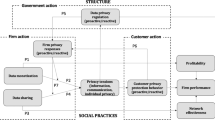Abstract
Libertarians often portray the decision to use enhancement technologies purely as a matter of individual choice, affecting the person who uses them but no one else. Yet individual choices often add up to large social changes that profoundly affect the lives of other people, effectively pushing individual choices in a particular direction. It seems plausible that self-reinforcing loops such as those that have driven the adoption of technologies like cars and air-conditioners might also play a role in the adoption of enhancement technologies, effectively exerting pressure on people to use a technology that they might otherwise resist.
Similar content being viewed by others
References
Ackerman, M. 2013. Cool comfort: America’s romance with air conditioning. Washington, DC: Smithsonian Books.
Arsenault, R. 1984. The end of the long hot summer: The air conditioner and southern culture. The Journal of Southern History 50(4): 597–628.
Diller, L. 2006. The last normal child: Essays on the intersection of kids, culture and psychiatric drugs. Westport, Connecticut: Praeger Publishers.
Elliott, C. 2010. White coat, black hat: Adventures on the dark side of medicine. Boston: Beacon Press.
Hacking, I. 1995. Rewriting the soul: Multiple personality and the sciences of memory. Princeton, New Jersey: Princeton University Press.
-----. 2000. The social construction of what? Cambridge, Massachusetts: Harvard University Press.
-----. 2006. Making up people. London Review of Books 28(16): 23–26.
Haiken, E. 1999. Venus envy: A history of cosmetic Surgery. Baltimore, Maryland: Johns Hopkins University Press.
Hardin, G. 1968. The tragedy of the commons. Science 162(3859): 1243–1248.
Hinshaw, S., and R. Scheffler. 2014. The ADHD explosion: Myths, medication, money and today’s push for performance. New York: Oxford University Press.
Lienhard, J. 2006. How invention begins: Echoes of old voices in the rise of new machines. New York: Oxford University Press.
Little, M. 2000. Cosmetic surgery, suspect norms and the ethics of complicity. In Enhancing human traits: ethical and social implications, edited by E. Parens, 162–176. Washington, DC: Georgetown University Press.
McHugh, P. 2008. Try to remember: Psychiatry’s clash over meaning, memory and mind. New York: Dana Press.
Ofshe, R., and E. Watters. 1996. Making monsters: False memories, psychotherapy, and sexual hysteria. Berkeley, California: University of California Press.
Ridgway, A., J. Northup, A. Pellegrin, and A. Hightshoe. 2003. Effects of recess on the classroom behavior of children with and without attention-deficit hyperactivity disorder. School Psychology Quarterly 18(3): 253–268.
Savage, J. 2007. Teenage: The creation of youth culture. New York: Viking Press.
Savulescu, J. 2005. New breeds of humans: The moral obligation to enhance. Reproductive Biomedicine Online. March 10(Supplement 1): 36–39.
Tenner, E. 1997. Why things bite back: Technology and the revenge of unintended consequences. New York: Vintage Books.
Trippett, F. 2000. Hymning and hawing about America: A few symbol-minded essays. Bloomington, Indiana: Xlibris Corp.
Author information
Authors and Affiliations
Corresponding author
Rights and permissions
About this article
Cite this article
Elliott, C. The Looping Effects of Enhancement Technologies. Bioethical Inquiry 16, 127–131 (2019). https://doi.org/10.1007/s11673-018-9893-2
Received:
Accepted:
Published:
Issue Date:
DOI: https://doi.org/10.1007/s11673-018-9893-2




